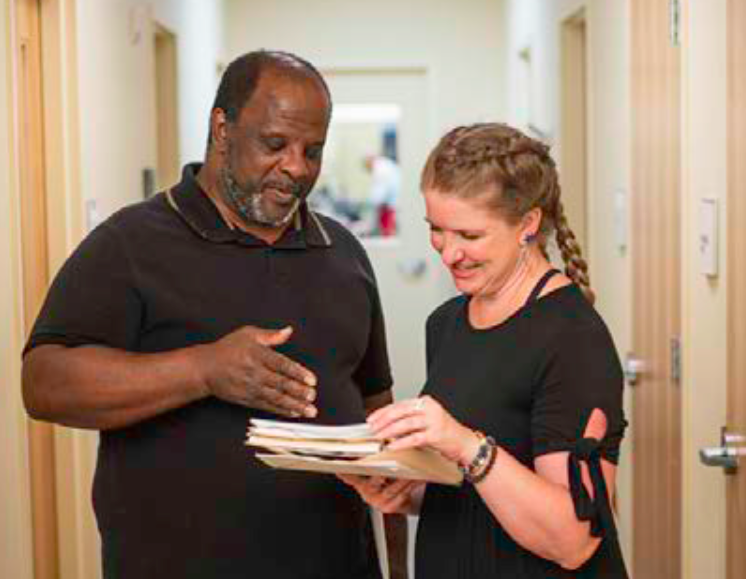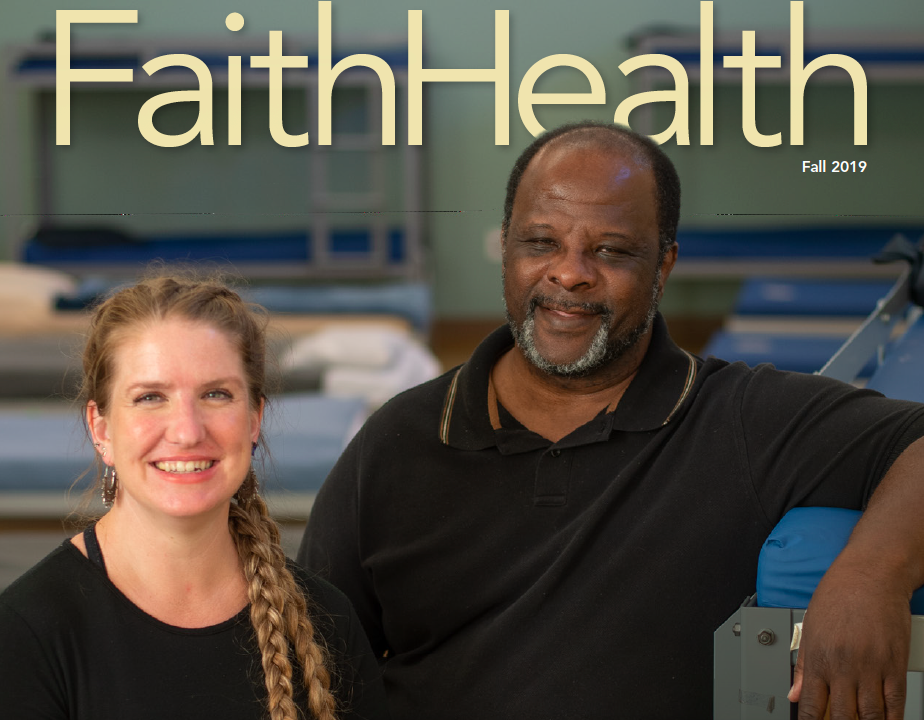By Les Gura
There are two people in Forsyth County who not only see these homeless people but spend hours hoping to penetrate their secret worlds.
They offer kindness.
Bree Ferguson and Obie Johnson — outreach workers with The Empowerment Project, a nonprofit that partners with Wake Forest Baptist Health’s Division of FaithHealth — come from disparate backgrounds.
Ferguson was the child of a family frequently involved in helping out through fundraising and volunteering for causes such as the Salvation Army. She attended the University of West Virginia and upon graduating became a staff member at a treatment home for women with a dual diagnosis — they had mental health and substance abuse issues.
She later worked in a wilderness camp in North Carolina working with children age 12 to 18 who were dual diagnosis, teaching them survival skills. Then she made her way to Winston-Salem, working in a mental health case management position before landing in 2010 with The Empowerment Project.
Johnson was raised in South Florida as the son of a seasonal agriculture worker, the eighth of nine children. He discovered marijuana at age 12 — “it was like a miracle drug to me” — and after getting hooked on crack cocaine while attending Winston-Salem State University on a wrestling scholarship, survived four hellacious years of addiction and homelessness.
Today, Johnson and Ferguson try to bring human contact and a window to further care to the hardcore homeless. It can take months to win so much as a grudging nod, much less a conversation, with someone on the street. But Johnson and Ferguson have been doing this for nearly 10 years; Ferguson most often makes rounds during the daytime and Johnson at night and in the wee hours.
Ferguson says when she was contacted about a position with The Empowerment Project, she was happy to learn who she’d be teaming up with.
“I knew Obie,” she says. “Everybody around working in this field knew Obie.”
She jumped at the opportunity, she says, because “we need to reach out to those people typically not coming in for traditional services; people with severe mental illness or substance abuse or both. They’re usually not open to accepting help. They’ve lost trust in the system.
“We’re known as the people in the community who won’t say no to anyone.”
Addiction, Recovery, Commitment
You know things have gotten bad when, penniless and trying to kick a cocaine addiction, the only place you have to stay is the sofa of a liquor house in the dead of winter.
 Johnson had fallen into addiction after dropping out of WSSU two classes shy of graduation, when the pressure and the drugs got to be too much. His dream of becoming a mental health worker seemed far off. Using drugs became his primary motivation as he lost his marriage and contact with his child.
Johnson had fallen into addiction after dropping out of WSSU two classes shy of graduation, when the pressure and the drugs got to be too much. His dream of becoming a mental health worker seemed far off. Using drugs became his primary motivation as he lost his marriage and contact with his child.
“I was working two jobs and still having to eat out of a trash can. Cut off from my kids. I couldn’t look in the mirror,” he says. “I got sick and tired of being sick and tired.”
Johnson sought help from a local reverend who helped people with addiction problems. He went to a recovery center to get clean. His residence in the liquor house came about in the early stages of his recovery, after Johnson, jobless, had used up the 90 days he was allowed to stay at a homeless shelter in Winston-Salem. A friend told him the liquor house had an old sofa, and he humbly asked and was granted permission to use it to sleep.
“What was very strange about living in the liquor house was seeing old friends I knew from getting high with. I didn’t have no money, and I was hungry,” he says. The old friends wouldn’t buy him a $2 fish sandwich at the liquor house, but they would buy him a beer. The bartender and Johnson worked out a deal: He’d sneak the bartender back the free beers, and the bartender would give him a dollar.
“At the time I was motivated by desperation,” Johnson says. “Even though that dirty couch in the drink house wasn’t the safest place, it was the best and safest place for me at that time.”
His deal with the bartender helped him survive. A couple of months later, he found a job working at a produce company.
In that period, Johnson also learned about kindness and generosity. Some of the churches in Winston-Salem in that era would open their doors and offer orange juice or cake in the morning. The people there would buy him breakfast when he attended 12-step meetings with them. He stayed clean.
Johnson would complete his missing classes and obtain his bachelor’s degree before moving to Florida to take a position as a substance abuse counselor in a home for pregnant, addicted women. As a newcomer to behavioral health, it was difficult for Johnson. A fair number of his clients were HIV-positive and their treatment with the drug AZT didn’t always work. Their deaths weighed heavily on Johnson.
In 1995, Johnson returned to Winston-Salem, becoming a mental health technician for Centerpoint Human Services; a year later he became a case manager. In that role, he met fellow employees whose passion and heart for their work fed his own motivation to help people. It led to his decision to join a federally funded program through Centerpoint that reached out to those with severe, persistent mental illness.
It was that program which, over time once Centerpoint closed in 2005, would become the present-day Empowerment Project.
Johnson has grown to understand a key concept behind what he does: His own skills and his lived experiences on their own are not guaranteed to allow a connection, much less persuade people to change.
“What I found was enough was when you learn the art of reaching into peoples’ souls, not to psychoanalyze them but just to have a presence with them,” he says. “I use reflective listening, active listening and paraphrasing to let them know I’m hearing them. And I’m allowing them to inform and direct their own treatment.”
Persistence, Patience, Hope
Ferguson graduated from the University of West Virginia with a degree in psychology. Her parents told her that even as a child she would hug random strangers.
That inner core translates well to her understanding about her work. Reaching the hardcore homeless, she and Johnson know, is largely about making inroads and not changing lives — certainly not immediately.
Ferguson shares a story about one man she has seen close to daily (including weekends) for about a year. He’s been on the streets of Winston-Salem for 20 years and has obvious mental health issues, she says, but he won’t accept traditional assistance such as outreach supplies; he simply doesn’t trust.
“Usually when I find him I can park my car and get out. He’s very, very incoherent so you can’t have a regular conversation,” she says. “But sometimes he’ll say ‘Hey’ and acknowledge me. He’ll fist-bump me every now and then. One time he said something about my hair being different. Those are considered progress.”
The goal with these interactions is to let people know there are resources available and that someone cares. Persistent engagement can build the trust that might eventually allow a person to consider coming to a shelter for a meal, or seeing a doctor about medication or even thinking about longer-term desires such as reconnecting with family or getting an apartment.
“I know the downfalls of our systems,” Ferguson says. “The number one priority is to just be with them and love them.”
The Art of Help
There is a certain art to assisting people who struggle to accept help or flat out deny it — especially while working with government systems whose rules often create other sets of problems.
For example, to solicit, homeless people must have a permit. A lot don’t know about them, don’t have them or don’t care about them. But if they accept money and a police officer sees them, that could result in a citation. And when they don’t show up for a court date, that’s another citation, failure to appear. The people Johnson and Ferguson work with often have lengthy lists of such citations. They don’t blame the police, who Ferguson says often support and help the homeless in myriad ways. It’s just a systemic problem.
Johnson and Ferguson manage all of these issues with a preternatural calm.
“There is art of accountability,” Johnson says. “Sometimes I make a lot of mistakes. But I don’t rationalize and justify. I just say, ‘Wow, I blew that and I messed up.’”
The key, he reiterates, is to be authentic with his homeless clients. Ferguson has similar thoughts.
“I know the downfalls of our systems, and it can be hard to keep hope or wonder ‘Is this actually helping?’”
Even then, Ferguson says, she tries to focus on the people who do come back or give her a nod or a smile. She says she gets a lot of mileage knowing someone feels better because she gave them her time.
“This is definitely a traumatic job,” Ferguson says. “You have to learn what could be a crisis and what is a crisis—and you have to learn not to make a big deal. Nothing is going to happen really fast, and you’re not going to solve problems quickly.
“But when you see people on the street, know they have the same heart as you. That’s huge.”

